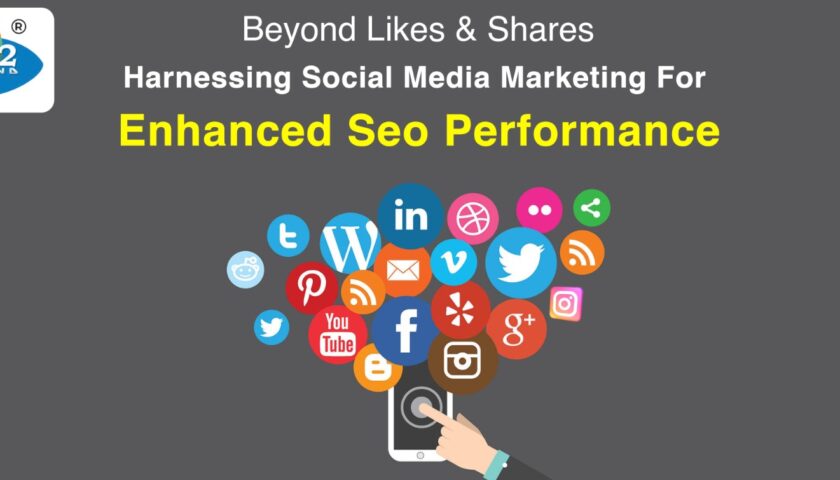In today\’s digital age, social media has become an integral part of our lives. From sharing personal moments to promoting businesses, social media platforms offer a vast array of opportunities. Beyond the surface level of likes and shares, harnessing social media marketing can have a significant impact on enhancing SEO performance. This article aims to explore the potential of utilizing social media platforms to boost search engine optimization strategies.
Beyond Likes & Shares: The Power of Social Media Marketing
Understanding the Link between Social Media and SEO
Social media and SEO may seem like two separate entities, but they are closely intertwined. While social media platforms do not directly impact search engine rankings, they can indirectly contribute to enhanced SEO performance. When utilized strategically, social media marketing can generate increased brand visibility, engagement, and traffic to a website. These factors, in turn, can positively influence search engine rankings.
Leveraging Social Signals for SEO
Social signals refer to the metrics and indicators generated by social media activities, such as likes, shares, comments, and followers. Search engines take into account these social signals to assess the credibility, popularity, and relevance of a website or content. By creating high-quality and shareable content that resonates with the target audience, businesses can attract social signals and signal search engines to rank their websites higher.
The Role of Social Media Platforms in SEO
Facebook: Connecting with a Vast Audience
Facebook remains the most popular social media platform, boasting over 2.8 billion monthly active users. Leveraging the power of Facebook can greatly benefit businesses in terms of SEO. By creating an engaging Facebook page, optimizing content with relevant keywords, and actively engaging with followers, businesses can increase brand awareness and drive traffic to their websites.
Instagram: Visual Storytelling for SEO Success
Instagram has emerged as a visual-centric platform, enabling businesses to share compelling images and videos. With over 1 billion active users, Instagram presents a significant opportunity for enhancing SEO performance. By utilizing Instagram effectively, businesses can showcase their products, connect with influencers, and drive traffic to their websites. Additionally, incorporating relevant keywords and hashtags in captions and profiles can improve discoverability.
Twitter: Real-Time Engagement and SEO
Twitter\’s fast-paced nature makes it ideal for real-time engagement and news updates. When used strategically, Twitter can contribute to SEO performance. By actively participating in conversations, sharing valuable content, and optimizing tweets with relevant keywords and hashtags, businesses can increase their online visibility and drive traffic to their websites.
FAQs about Social Media Marketing and SEO
Q1: How does social media marketing impact SEO?
A1: While social media marketing does not directly impact search engine rankings, it can indirectly influence SEO performance by increasing brand visibility, engagement, and website traffic.
Q2: Which social media platform is the most effective for SEO?
A2: The effectiveness of a social media platform for SEO depends on the target audience and the nature of the business. Facebook, Instagram, and Twitter are popular platforms that can positively impact SEO when utilized strategically.
Q3: Can social signals improve search engine rankings?
A3: Yes, social signals, such as likes, shares, comments, and followers, can indirectly improve search engine rankings by indicating the popularity and relevance of a website or content.
Q4: How can businesses optimize their social media profiles for SEO?
A4: Businesses can optimize their social media profiles for SEO by using relevant keywords in bios, captions, and descriptions, incorporating hashtags, and sharing high-quality and engaging content.
Q5: Is it necessary to be active on all social media platforms for SEO benefits?
A5: It is not necessary to be active on all social media platforms. Businesses should focus on platforms that align with their target audience and industry to achieve the best SEO results.
Q6: Can social media engagement directly impact website rankings?
A6: While social media engagement does not have a direct impact on website rankings, it can contribute to increased website traffic, which is a crucial factor in SEO performance.
Conclusion
Incorporating social media marketing into your SEO strategy can yield significant benefits for your business. By understanding the link between social media and SEO and leveraging social signals, businesses can enhance their online visibility and improve search engine rankings. Facebook, Instagram, and Twitter are powerful platforms that offer unique opportunities for engagement, brand awareness, and driving traffic to websites. Optimizing social media profiles with relevant keywords, hashtags, and high-quality content is essential for maximizing SEO performance. While it is not necessary to be active on all social media platforms, businesses should focus on those that align with their target audience and industry. By harnessing the power of social media marketing, businesses can unlock new avenues for success in the digital landscape.
If you need assistance with social media marketing and SEO strategies, consider partnering with a professional marketing agency like Ad2Brand. With their expertise and experience, they can help you navigate the complexities of social media platforms and optimize your SEO performance for maximum impact.




